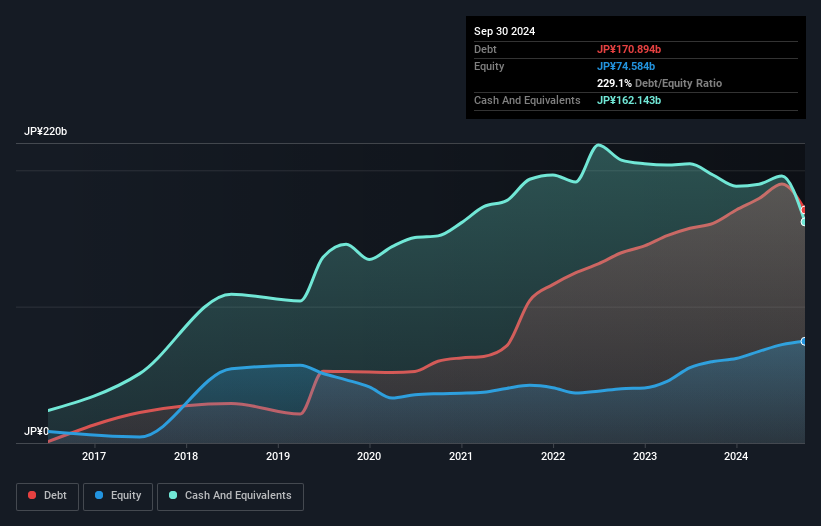Here's Why Mercari (TSE:4385) Has A Meaningful Debt Burden

Warren Buffett famously said, 'Volatility is far from synonymous with risk.' When we think about how risky a company is, we always like to look at its use of debt, since debt overload can lead to ruin. We can see that Mercari, Inc. (TSE:4385) does use debt in its business. But is this debt a concern to shareholders?
What Risk Does Debt Bring?
Debt and other liabilities become risky for a business when it cannot easily fulfill those obligations, either with free cash flow or by raising capital at an attractive price. In the worst case scenario, a company can go bankrupt if it cannot pay its creditors. While that is not too common, we often do see indebted companies permanently diluting shareholders because lenders force them to raise capital at a distressed price. Having said that, the most common situation is where a company manages its debt reasonably well - and to its own advantage. The first step when considering a company's debt levels is to consider its cash and debt together.
View our latest analysis for Mercari
How Much Debt Does Mercari Carry?
As you can see below, at the end of September 2024, Mercari had JP¥170.9b of debt, up from JP¥161.1b a year ago. Click the image for more detail. However, it does have JP¥162.1b in cash offsetting this, leading to net debt of about JP¥8.75b.

A Look At Mercari's Liabilities
Zooming in on the latest balance sheet data, we can see that Mercari had liabilities of JP¥297.4b due within 12 months and liabilities of JP¥112.7b due beyond that. Offsetting this, it had JP¥162.1b in cash and JP¥206.6b in receivables that were due within 12 months. So it has liabilities totalling JP¥41.4b more than its cash and near-term receivables, combined.
Of course, Mercari has a market capitalization of JP¥282.3b, so these liabilities are probably manageable. Having said that, it's clear that we should continue to monitor its balance sheet, lest it change for the worse.
We measure a company's debt load relative to its earnings power by looking at its net debt divided by its earnings before interest, tax, depreciation, and amortization (EBITDA) and by calculating how easily its earnings before interest and tax (EBIT) cover its interest expense (interest cover). This way, we consider both the absolute quantum of the debt, as well as the interest rates paid on it.
Mercari has net debt of just 0.46 times EBITDA, suggesting it could ramp leverage without breaking a sweat. But the really cool thing is that it actually managed to receive more interest than it paid, over the last year. So it's fair to say it can handle debt like a hotshot teppanyaki chef handles cooking. But the other side of the story is that Mercari saw its EBIT decline by 5.6% over the last year. That sort of decline, if sustained, will obviously make debt harder to handle. There's no doubt that we learn most about debt from the balance sheet. But ultimately the future profitability of the business will decide if Mercari can strengthen its balance sheet over time. So if you're focused on the future you can check out this free report showing analyst profit forecasts.
But our final consideration is also important, because a company cannot pay debt with paper profits; it needs cold hard cash. So we always check how much of that EBIT is translated into free cash flow. During the last two years, Mercari burned a lot of cash. While that may be a result of expenditure for growth, it does make the debt far more risky.
Our View
While Mercari's conversion of EBIT to free cash flow has us nervous. To wit both its interest cover and net debt to EBITDA were encouraging signs. We think that Mercari's debt does make it a bit risky, after considering the aforementioned data points together. Not all risk is bad, as it can boost share price returns if it pays off, but this debt risk is worth keeping in mind. When analysing debt levels, the balance sheet is the obvious place to start. But ultimately, every company can contain risks that exist outside of the balance sheet. Case in point: We've spotted 2 warning signs for Mercari you should be aware of, and 1 of them can't be ignored.
If you're interested in investing in businesses that can grow profits without the burden of debt, then check out this free list of growing businesses that have net cash on the balance sheet.
New: Manage All Your Stock Portfolios in One Place
We've created the ultimate portfolio companion for stock investors, and it's free.
• Connect an unlimited number of Portfolios and see your total in one currency
• Be alerted to new Warning Signs or Risks via email or mobile
• Track the Fair Value of your stocks
Have feedback on this article? Concerned about the content? Get in touch with us directly. Alternatively, email editorial-team (at) simplywallst.com.
This article by Simply Wall St is general in nature. We provide commentary based on historical data and analyst forecasts only using an unbiased methodology and our articles are not intended to be financial advice. It does not constitute a recommendation to buy or sell any stock, and does not take account of your objectives, or your financial situation. We aim to bring you long-term focused analysis driven by fundamental data. Note that our analysis may not factor in the latest price-sensitive company announcements or qualitative material. Simply Wall St has no position in any stocks mentioned.
About TSE:4385
Mercari
Plans, develops, and operates Mercari marketplace applications in Japan and the United States.
Adequate balance sheet with moderate growth potential.
Similar Companies
Market Insights
Community Narratives




